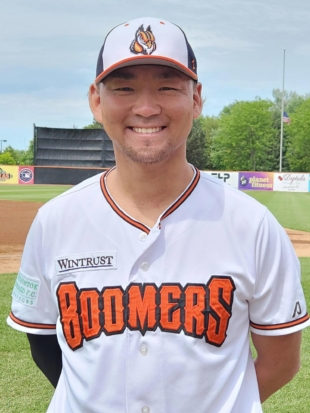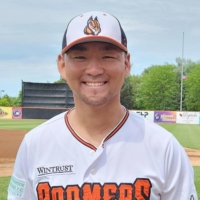Jumpei Akanuma is a 26-year-old Japanese pitcher chasing his pro baseball dreams in the Frontier League, far from the spotlight of the major leagues.
He plays for the Schaumburg Boomers in the United States’ largest and longest-running independent league, having returned to the Illinois-based team after a 2½ year hiatus caused by the coronavirus pandemic and subsequent delays with his visa.

“I’m finally getting my groove back,” said the right-hander, who had a no-decision in his May 18 season debut and picked up his first win the following week, on May 24.
Akanuma first played for the Boomers in 2019 after moving from Indiana’s Gary Southshore Railcats of the independent American Association.
The Frontier League features 16 teams from multiple states including New York, New Jersey, Indiana, Illinois, Kentucky, Ohio, Pennsylvania and the Canadian provinces of Quebec and Ontario. It is an official partner league of Major League Baseball.
After graduating from Ritsumeikan Senior High School in his home prefecture of Kyoto, Akanuma moved to the United States because he felt the odds of a no-name high school player becoming a pro in Japan were slim.
He pitched two seasons at the College of the Desert, a junior college in California, before transferring to spend two seasons at Lee University, an NCAA Division II school in Tennessee.
Akanuma’s coaches and teammates were impressed by his communication skills, and not just his excellent English.
But fate would clash with his dreams, and Akanuma’s career was put on hold just as he started to see minor league ball in the States as a realistic target. He was thrown into what he described as a “long offseason.”
In 2019, Akanuma went 1-0 with a 3.25 ERA with 19 strikeouts in 10 games with the Boomers. Before he could build on that, fate intervened — the 2020 season was canceled, while 2021 was spent in visa limbo.
Foreign-born players are typically allowed to be in the United States on a P-1 visa, a temporary worker visa for internationally recognized athletes. Delays in visas for ballplayers are not uncommon — even more so during the pandemic — and he was not able to restart until this spring.
“Good news. It looks like I’m finally getting my work permit,” Akanuma tweeted on March 14.

“It was a long wait, but I get to play baseball in America again. I hope to repay all the people who support me through my work on the field,” he said.
Unlike players in the MLB, independent baseball league players earn modest salaries and may work other jobs during the offseason.
The Frontier League salary cap was increased to $85,000 in 2020, according to multiple media reports, and in-season rosters can have a maximum of 24 active players. In MLB, the average player salary in 2022 is $4.4 million, the Associated Press reported.
While he was competitively inactive, Akanuma worked at a sports training facility in Hiroshima, where Nippon Professional Baseball players, including Orix Buffaloes starting pitcher Taisuke Yamaoka, worked out in the offseason.
Akanuma joined practices, an experience he found both exciting and intimidating as he fretted over his conditioning and his lack of a path forward in pro baseball.
“I felt motivated and it helped me grow,” Akanuma said.
“But my eyes would get irritated and I would find myself hyperventilating. I didn’t realize how stressed I was (by the uncertainty).”
Despite running into some career roadblocks, Akanuma still has his eye on the MLB prize.
“I’m giving myself until I’m 30 to keep trying,” he said.
In a time of both misinformation and too much information, quality journalism is more crucial than ever.
By subscribing, you can help us get the story right.
Source : Baseball – The Japan Times

